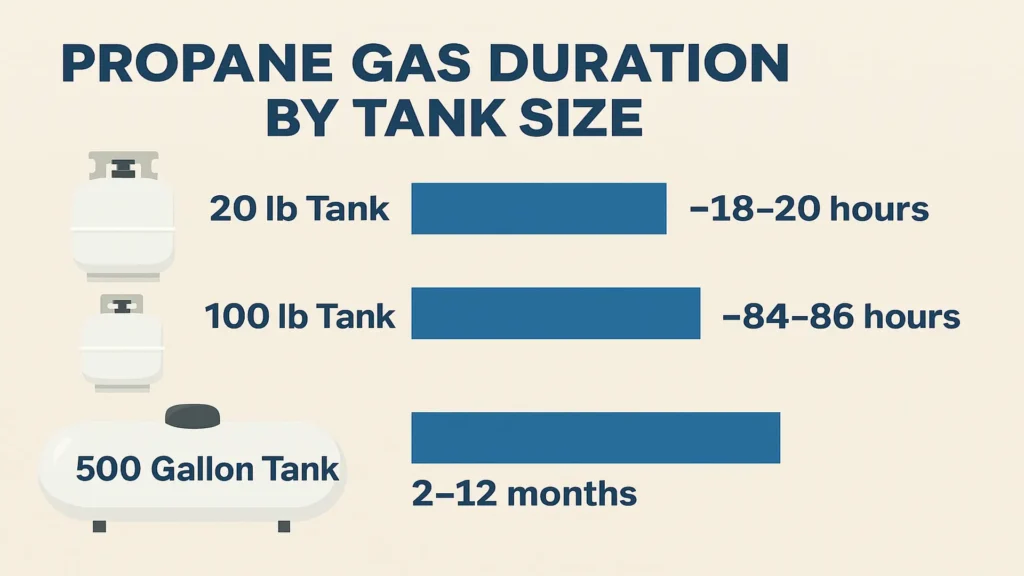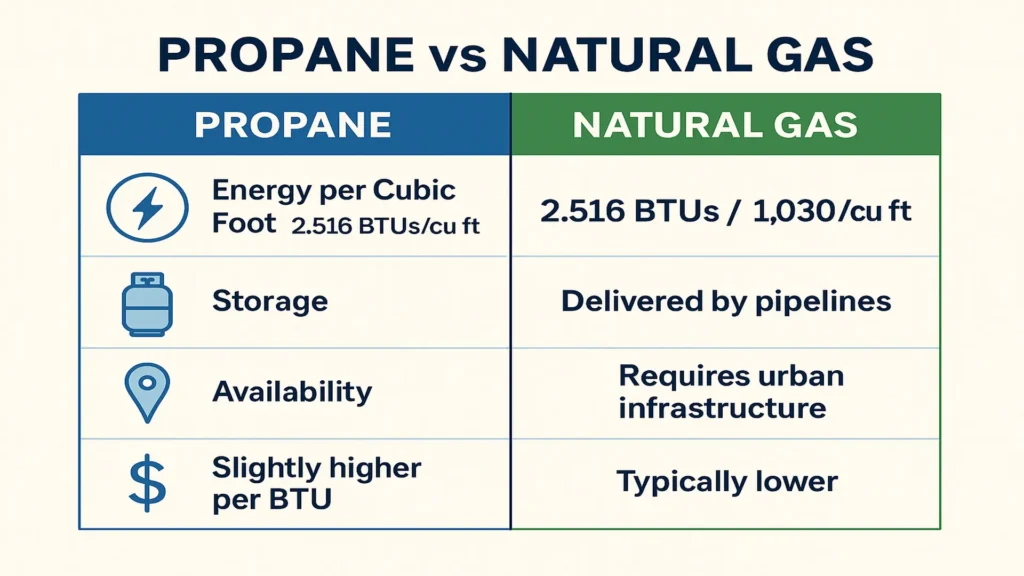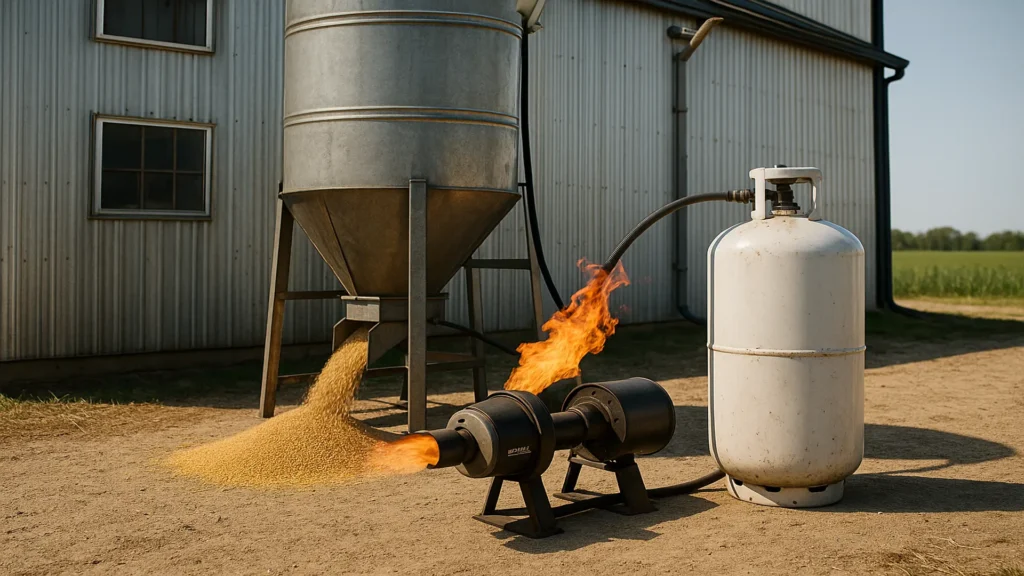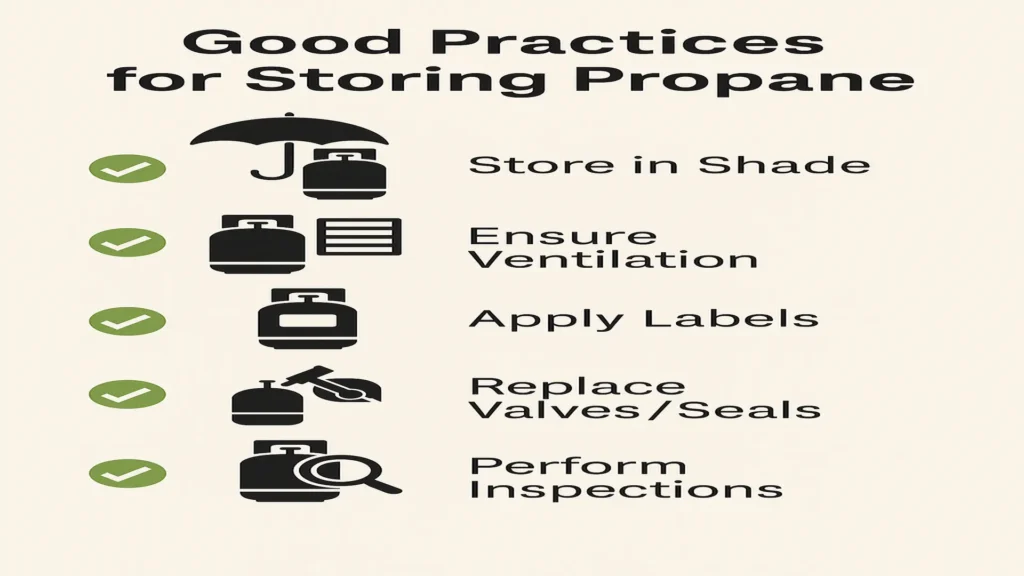Table of Contents
- What is propane gas and why is it so widely used?
- Does propane get damaged over time?
- How long does propane last in a tank?
- How long can propane be stored without losing efficiency?
- What is the difference between propane and natural gas?
- Propane vs. electricity at home
- Industrial and agricultural applications
- Safety and regulations for propane gas use
- Common propane storage errors
- Good practices for extended propane storage
- conclusions and recommendations
- References
Introduction
Propane gas is a fossil energy source widely used around the world for its versatility, efficiency and ease of storage. From rural areas in Latin America to industrial areas in the United States, Europe and Asia, this fuel has proven to be a reliable solution for heating, cooking, power generation and multiple industrial uses. In homes as well as in productive sectors, propane represents a viable alternative to electricity or natural gas, especially in places where energy infrastructure is limited.
With the growing global interest in energy efficiency, self-sufficiency and cost reduction, many people are asking: how long does propane last in a tank and does propane become damaged over time? This article answers those concerns, exploring the properties of propane gas, how it compares to natural gas and electricity, and best practices for extended storage.
What is propane gas and why is it so widely used?
It is a hydrocarbon classified as liquefied petroleum gas (LPG). It is obtained from natural gas processing and crude oil refining. Recognized for its clean burning and high energy efficiency, this gas is widely used in residential heating, cooking, water heating, industrial applications and agricultural operations.
The chemical formula of propane is C3H8, which places it in the alkane group. Its compact structure makes it energetically dense: one gallon of liquid propane provides approximately 91,500 BTUs. This property makes it an excellent source of heat and power, especially useful in cold regions or in off-grid applications. For a deeper understanding of the process, you can consult our article on oil distillation.
Key characteristics of propane
- High energy efficiency: Provides more energy per unit than natural gas.
- Non-toxic and odorless: Ethyl mercaptan is added to facilitate leak detection.
- Stable at room temperature: Stored in liquid form under moderate pressure.
- Clean burning: Emits fewer greenhouse gases than other fossil fuels.
- Versatility: Adapts to both domestic and industrial contexts.
Does propane get damaged over time?
It is one of the most frequently asked questions over time. The answer is reassuring: propane is not damaged. Its chemical stability allows it to remain free of deterioration and evaporation when properly stored. Whether in a small grill tank or a large industrial cylinder, the gas retains its energy potential indefinitely as long as the tank is sealed and intact.
Therefore, the idea that propane is damaged is a myth. Unlike gasoline or diesel, propane does not oxidize or generate residues that affect its performance. Even after years of storage, it can be used as efficiently as when it was first filled.
How long does propane last in a tank?
The useful life of propane gas is practically indefinite, but its duration in use will depend on consumption and tank size. Here is a general estimate:
- 20 lb tank (grills): ~18-20 hours at average heat.
- 100 lb tank: ~84-86 hours at average heat use.
- 500 gallon residential tank: Can last 2-12 months depending on consumption.

So how long does propane last? In most U.S. homes, a well-maintained 500-gallon tank can supply central heating, cooking and hot water for an entire season.
In addition, the life of propane in a tank will also depend on equipment efficiency, frequency of use and environmental conditions. A well-insulated home can extend the life of the fuel significantly.
How long can propane be stored without losing efficiency?
This is the key question: How long can propane gas be stored without loss of efficiency? The reality is that, if safety conditions, tank structural integrity and emissions control are properly met, propane gas can be stored for decades without degradation or loss of energy power.
To learn more about best practices and related regulations, we recommend reading Inspenet’s article “Safety and Emission Control Systems in Storage Tanks”, which provides detailed information on devices and strategies to maintain efficiency and safety in the storage of gases such as propane.
Recommended actions to ensure long-term efficiency include:
- Tank integrity: must be free of corrosion and kept well sealed.
- Proper location: in a ventilated place, away from humidity and excessive heat sources.
- Periodic inspections: constant inspection of valves, connections and gauges to detect possible leaks.
This is essential for owners of rural homes or seasonal residences, who can store propane for years without worrying about its performance. It also makes it an ideal choice as a backup power source for hospitals, agribusiness facilities or critical infrastructure.
What is the difference between propane and natural gas?
This is a common question, especially for first-time owners.
| Característica | Propano | Gas natural |
| Energía por unidad | 2,516 BTUs/pie cúbico | 1,030 BTUs/pie cúbico |
| Almacenamiento | Comprimido en tanques | Distribuido por tuberías |
| Disponibilidad | Útil fuera de la red | Requiere infraestructura urbana |
| Costo | Ligeramente mayor por BTU | Más bajo en ciudades |
So what’s the difference between propane and natural gas? Propane is ideal for rural areas, off-grid homes or mobile installations, while natural gas is better suited to urban environments with access to distribution networks. If you want to learn more, Inspenet offers a discussion on natural gas: processing, uses and benefits.
From a technical standpoint, propane has more than twice the calorific value per cubic foot, which means that less is needed to generate the same amount of energy. In addition, its self-contained storage capacity gives it an advantage in areas without infrastructure. For recent developments in this area, see Inspenet’s article on gas-to-liquid technology: progress and impact.

In addition, the International Energy Agency highlights propane’s role in driving global energy efficiency, especially in residential and rural applications where clean and available solutions are required.
Propane vs. electricity at home
When comparing propane to electricity for domestic use, these are the key points:
- Efficiency: Propane boilers exceed 90% efficiency, often outperforming electric systems.
- Cost: Depending on the region, propane can be more cost-effective, especially during times of high electricity demand.
- Availability: Propane is available anywhere, whereas electricity can fail during power outages.
- Environmental impact: Although it is not renewable, it burns cleaner than coal-fired electricity.
In cold regions of the U.S., many households choose propane for heating because of its consistent performance and reliability during storms. In addition, the International Energy Agency and the U.S. Department of Energy highlight propane’s role in driving global energy efficiency.
Industrial and agricultural applications
In the industrial sector, propane is used in drying processes, steam generation, metal smelting and heavy machinery operation. Its ability to generate constant heat makes it a key resource for factories, sawmills and metalworking shops. To learn more about solutions applied to these operations, see Inspenet’s article: Solutions for fuel storage terminals.
In agriculture, it is used for greenhouse heating, grain drying and pest control. In both cases, the life of propane in a tank will depend on continuous use, but its efficiency and low maintenance justify its choice.

Safety and regulations for propane gas use
The handling of propane gas is regulated by specific standards that ensure the safety of users. In the United States, NFPA 58 establishes guidelines for the safe storage, handling, transportation and use of liquefied petroleum gas, mitigates risks and ensures the safety of facilities to prevent failures, leaks and tampering that can cause fires and explosions.
To learn more about the regulations applicable to terminals and storage tanks, visit Inspenet’s article: Regulations for terminals and storage tanks. Complying with these regulations not only prevents accidents, but also ensures the long-term efficiency of the system.
The most relevant recommendations include:
- Install indoor leak detectors.
- Train personnel in industrial installations.
- Perform mandatory annual maintenance on fixed systems.
The investment in safety reinforces the reliability of this gas as an energy source, especially in households with children or in intensive use facilities.
Common propane storage errors
Although propane is a safe fuel, there are practices that should be avoided to ensure responsible handling:
- Storing tanks in direct sunlight without ventilation.
- Using defective or improvised valves.
- Failure to perform annual inspections.
These errors not only compromise storage efficiency, but also gas transportation safety, increasing the risk of leaks or accidents. Such operational failures can fuel the misconception that propane is damaged, when in fact it is improper handling that puts its integrity at risk.
Good practices for extended propane storage
To keep your gas safe and efficient for a long time:
- Use certified tanks with inspection labels.
- Store in an upright position, in ventilated and shaded places.
- Avoid exposure to extreme temperatures.
- Replace old valves or seals when necessary.
- Label tanks with date of filling.

Through the proper application of these practices, a longer life of propane is achieved, which represents a profitable investment for the home or industry.
To complement the knowledge covered in this article, we recommend the following video that explains the best practices for storing, detecting leaks and handling propane tanks correctly, Source: Fuente: Crystal Flash

Propane safety facts and tips.
conclusions and recommendations
Propane gas remains one of the most stable and efficient fuels available today. From its chemical resistance to its extended tank life, this gas is ideal for residential, commercial and emergency applications. It does not degrade, holds up well over the long term and offers a flexibility that electricity or natural gas does not always guarantee.
Understanding how long propane lasts, debunking myths such as propane damage, and knowing how long propane lasts in a tank and what the difference is between propane and natural gas allows you to make smarter energy decisions. Whether you live in an urban apartment or a secluded cabin, propane is a reliable, efficient and cost-effective energy source for many years to come.
References
- Propane: Wikipredia (https://en.wikipedia.org/wiki/Propane)
- NFPA 58 : Liquefied Petroleum Gas Code (https://www.nfpa.org/codes-and-standards/nfpa-58-standard-development/58)


